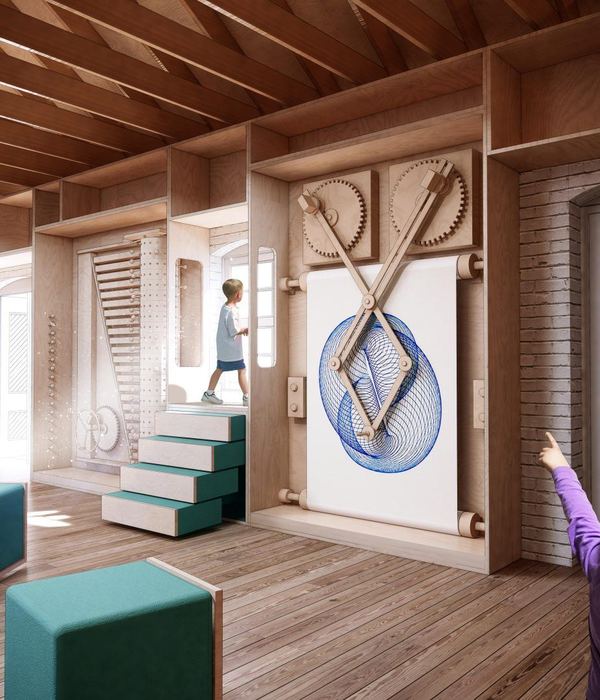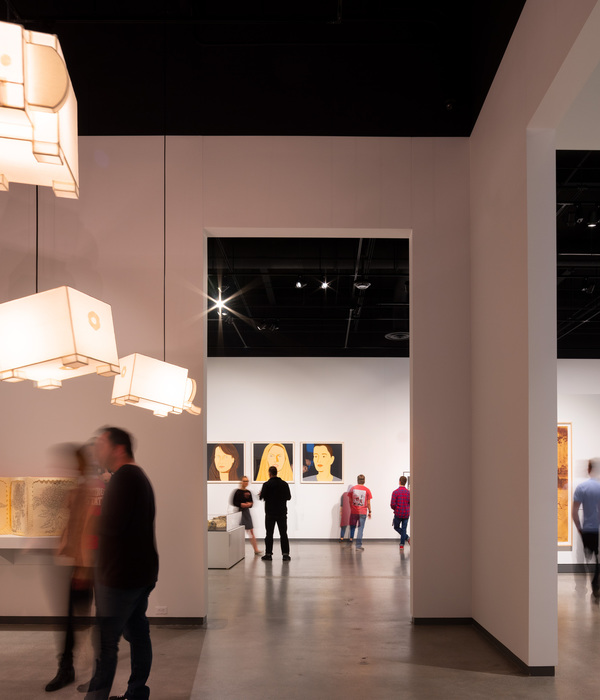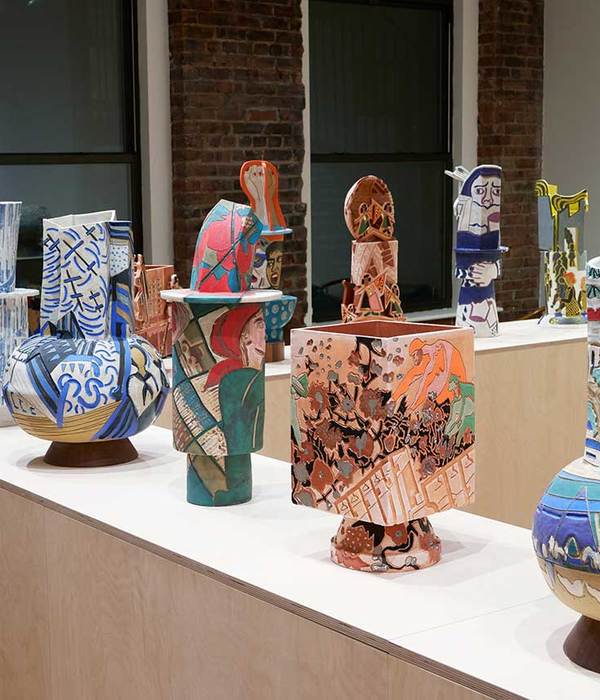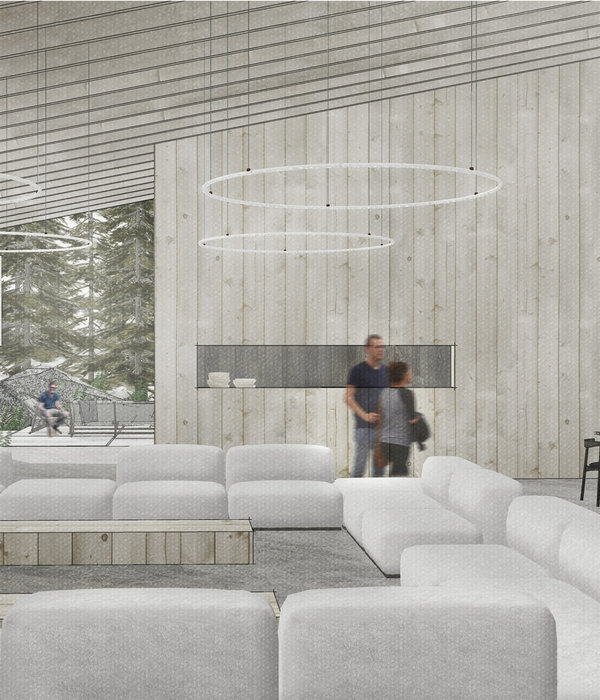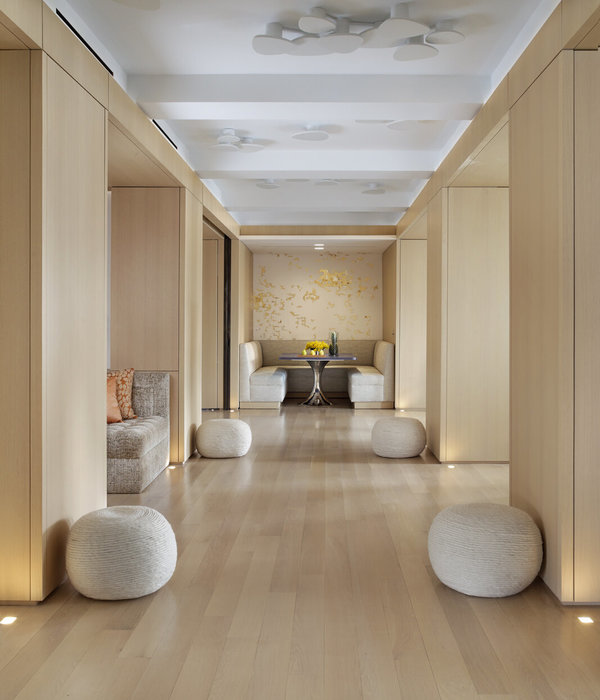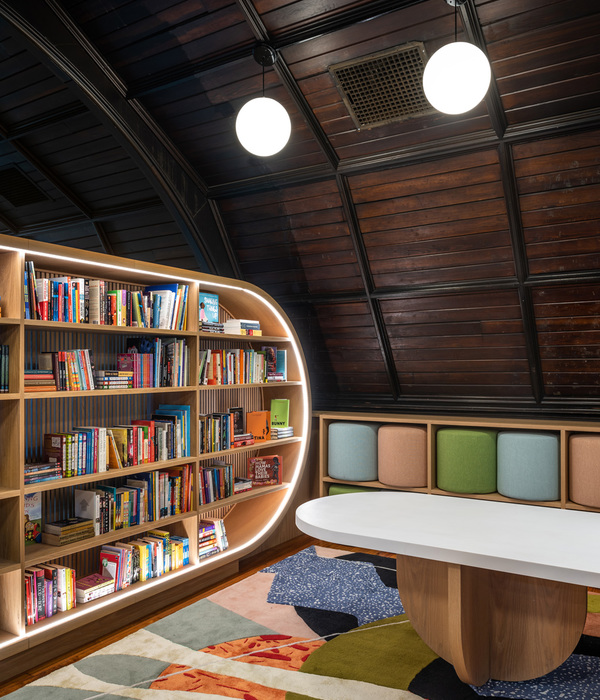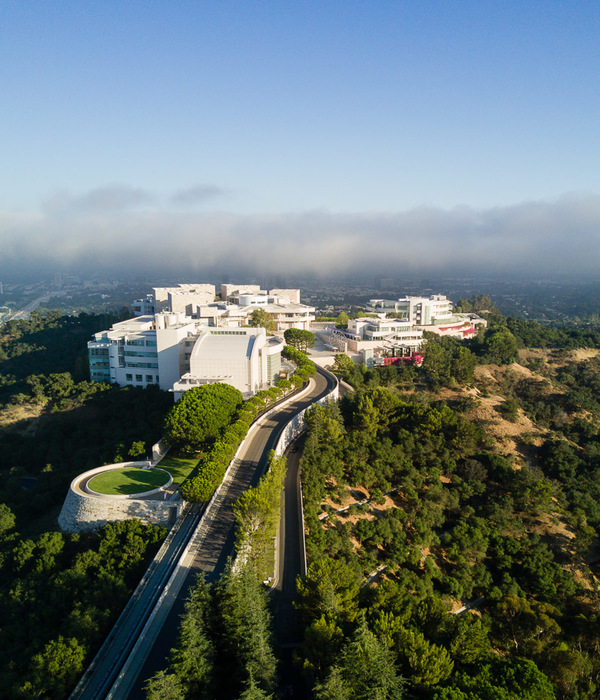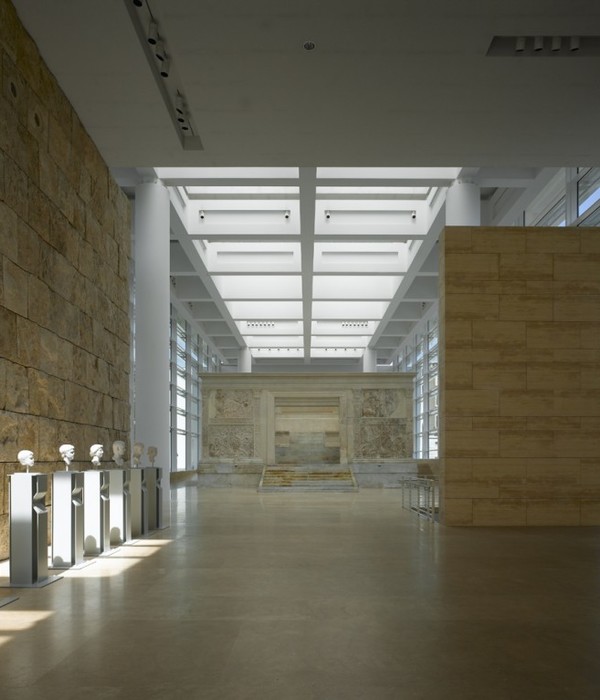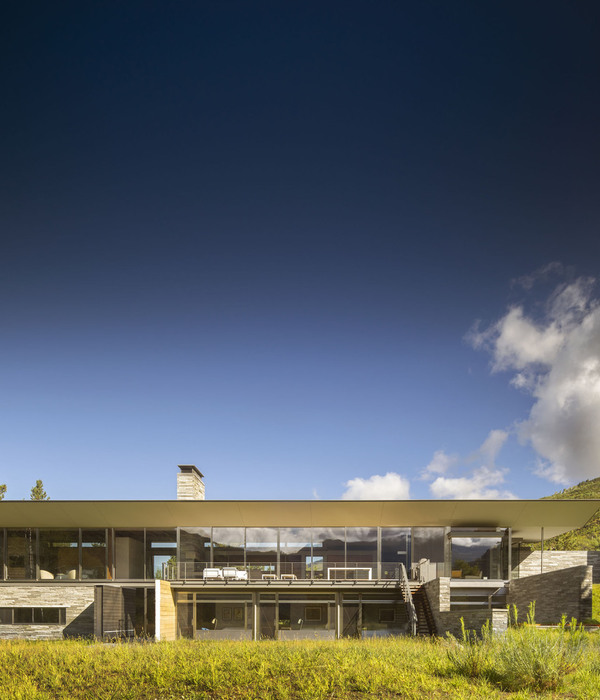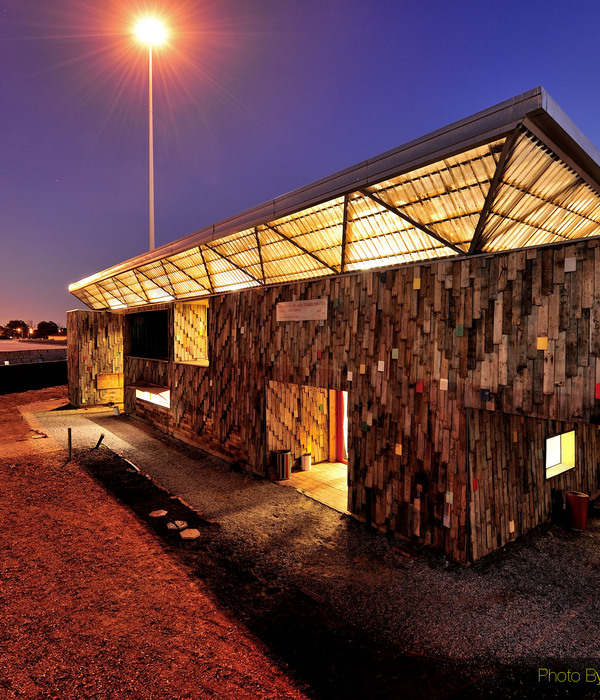杭州亚运公园的曲棍球场由长125米自由跨度翼形屋顶覆盖,成为园区中的景观雕塑。
Covered by a 125-meter Free-Span Wing Roof, Archi-Tectonics’ Field Hockey Stadium at Hangzhou Asian Games Park doubles as a Landscape Sculpture.
▼建筑与环境,Building and the environment ©SFAP Shanghai
亚运会曲棍球场馆下沉于地面5米,在曲线形景观中脱颖而出,开放向周边环境,成为公园中包容而具雕塑感的元素。透明的125米自由跨度翼形屋顶将大厅与观众席覆盖,而球场则作为椭圆形嵌入式草坪融于杭州亚运会公园景观之中,这座面积47公顷的生态园由Archi-Tectonics设计,带有两个亚运会体育场馆。
▼分析图,Diagram ©Archi-Tectonics
Set five meters down into the site, this Field Hockey Stadium for Asian Games appears to emerge out of the folding landscape, opening itself to the surroundings as a porous and sculptural element in the park. A diaphanous 125-meter free-span wing roof shades the lobby and stands, while the playing field is set in a recessed oval grass plain part of the rolling landscape of Hangzhou Asian Games Park, Archi-Tectonics’ 47-hectare eco-park with two stadiums for Asian Games.
▼屋顶曲线,Roof curve ©SFAP Shanghai
“大多数体育场都像是堡垒,而我们的设计仿佛景观艺术” —Archi-Tectonics 的创始合伙人 “Most stadiums are fortresses, ours is more like land art.” —Winka Dubbeldam, Founding Partner of Archi-Tectonics
▼形体分析图,Forming diagram ©Archi-Tectonics
▼景观艺术,Building as land art ©SFAP Shanghai
作为整体景观的一部分,可容纳5000人的体育场在广场与运动场之间不断权衡立面设计。观众穿过35米高的玻璃中庭,走进下方开放的运动场。从平面上,屋顶与运动场呈两个相交的椭圆,仿佛生命之源—永恒的象征—又像双鱼座一样,自从欧几里得时期一直沿用至今的几何形式与比例关系。就像河卵石在水中形成的通信涟漪一样,看台曲线不断偏移向中庭,最后延伸到广场。
As an integral part of the landscape, the 5,000–seat stadium mediates the shifting elevations between the plaza and the playing field. Passing through a spacious glass atrium with 35-meter high ceilings, spectators approach the playing fields which open up below them. In plan, the roof and field take the shape of two intersecting ovals, resembling the Seed of Life—a symbol of eternity—or the Vesica Piscis, a geometric configuration and proportioning system in use since the time of Euclid. Like the concentric ripples a pebble forms in water, the curving stands radiate outward into the curved atrium and beyond to the plaza.
▼建筑顶视,Topview of the building ©SFAP Shanghai
▼建筑特写,Close-up of the building ©SFAP Shanghai
屋顶的材质与结构灵感来源于传统麦田油纸和竹伞。设计一次扫过整个跨度。一根弯曲的量将屋顶连接在一起,使网格保持张力。屋顶悬停于建筑上方1米的位置,保证室内自然通风。
The roof’s materiality and structure take the traditional Meinong oil paper and bamboo umbrella as inspiration. It spans the entire distance in one sweep. A single curving beam holds the roof together, keeping the mesh in tension. The roof hovers about a meter above the building, creating a natural draft that brings cool air over the spectators.
▼油纸与主伞为灵感的钢结构,Steel structure inspired by oil paper and bamboo umbrella ©SFAP Shanghai
▼钢结构特写,Close-up of the steel structure ©SFAP Shanghai
环形结构围绕整个屋顶—最细处1米,最粗处1.5米—由4根粗壮的混凝土雕塑结构支撑。
The ring that surrounds the sunroof —1 meter in diameter at its thinnest and 1.5 meters at its thickest—is held down by 4 massive concrete sculptural elements.
▼运动场概览,Overview of the playground ©SFAP Shanghai
▼屋顶下的看台,Stands under the roof ©SFAP Shanghai
“混凝土台基不能支撑结构,它们会下沉,整个结构都会承受张力” Dubbeldam说。通过与结构工程师Thornton Tomasetti的合作,Archi-Tectonics反复迭代多次翼形屋顶原型,最终获得了超轻盈的结构,实现了自由跨度设计。
“The concrete abutments don’t keep the structure up, they weigh it down and keep the entire construction in tension,” says Dubbeldam. Working closely with structural engineer Thornton Tomasetti, Archi-Tectonics prototyped and tested several iterations of the wing roof, arriving at an ultra-lightweight structure that makes its free span possible.
▼混凝土台基,Concrete abutments ©SFAP Shanghai
整个建筑每一层都采用了三维建模—从施工人员管理,到物料计算,预算规划和细节设计—实现了中国的首个BIM协作项目(公园和7座建筑),并因此获奖。
The entire building was 3D modeled and integrated at every level—from construction staff management to material flows, budget considerations, and detailing—making it the first project [park and 7 buildings] in China to be fully coordinated in BIM, and awarded for that.
▼混凝土台基,Concrete abutments ©SFAP Shanghai
“我们设计的外形十分简约,但这需要突破性的工程技术才能实现。” —Dubbeldam “We designed a simple form that took a groundbreaking feat of engineering to achieve.” —Dubbeldam
▼结构分析图,Structure diagram ©Archi-Tectonics
现浇混凝土结构向入口广场开放,整面玻璃覆盖的大厅设置在倾斜的看台下。VIP休息区和停车场位大堂下方的一层,它与地形坡度融为一体。除了用于曲棍球比赛外,该场地还可以用于举办户外电影放映,音乐节和其他活动。
The poured-in-place concrete structure opens onto an entry plaza with a sweeping glass lobby tucked beneath the sloping shape of the stands. VIP lounges and parking areas are located on the ground floor under the main lobby, its access integrated into a slope in the topography. In addition to the field hockey games, the stadium will also host outdoor film screenings, concerts, and other events.
双曲面的玻璃立面环绕大堂,由工程硬木和钢结构支撑,塑造了迷人的光影互动。高技派的设计与传统的本地饰面相平衡—比如用本地竹子覆盖的室内墙体,使该建筑可持续化并根植于当地遗产。
The double curved glass facade encloses the lobby, supported by engineered hardwood and steel structure that creates a dramatic interplay of light and shadow. These high-tech forms are balanced by more traditional local finishes—like interior walls clad in locally sourced bamboo, making for a sustainable building rooted in the region’s heritage.
▼大堂,The lobby ©SFAP Shanghai
周围斜坡上的景观,由“!Melk!”设计—采用了可持续海绵城市理念,与本地植被和优雅的铺地肌理融为一体,形成多孔城市。该建筑原计划为公园里的非永久性结构,等运动会结束后就拆除。很幸运的是建筑师的设计改变了这一提议,客户也同意打造一座多功能文化综合体,在运动会后还能服务于周边社区。
The surrounding sloping landscape, designed by !Melk!—follows a sustainable sponge city approach, integrates local vegetation and elegant pavement patterns integrate porous areas. The building was planned to be a non-permanent structure in the park, dismantled once the Games end. Luckily this has changed as the architects proposed, and the client agreed, to create a hybrid that will have a cultural function for the neighborhood after the Games.
▼室内概览,Overview of the interior ©SFAP Shanghai
此届亚运会是仅次于奥运会的第二大国际体育赛事,于 2023 年 10 月举行。
This year’s edition of the Asian Games—the second-largest international sporting competition behind the Olympics—was held October 2023.
▼夜景,Night view ©SFAP Shanghai
▼总平面图,Masterplan ©Archi-Tectonics
▼首层平面图,Ground floor plan ©Archi-Tectonics
▼城市立面图,Urban elevation ©Archi-Tectonics
▼剖面图,Section ©Archi-Tectonics
▼立面图,Elevation ©Archi-Tectonics
▼轴测图,Axonometric ©Archi-Tectonics
▼场馆轴测图,Stadium axonometric ©Archi-Tectonics
▼日照分析,Sunlight hour analysis ©Archi-Tectonics
Type: Hybrid: Field hockey stadium as landscape topography Location: Hangzhou, China Built Area: 18,000 m2 / 5000 seats Date: Winning of competition may 2018, completion: October 2022, Opening Games Oct 2023 Architect: Archi-Tectonics NYC, LLC With: Thornton Tomasetti Engineers, !Melk Landscape and Mobility in Chain traffic engineers LDI: Zhejiang Province Institute Of Architectural Design And Research (ZIAD) Construction drawing design consultation: Powerchina Huadong Engineering Corporation Limited (HDEC) General contractor: China Power Construction Group East China Survey and Design Research Institute Co., Ltd. Landscape Design: !Melk NY Construction unit: Zhejiang Xinsheng Construction Group Co., Ltd. Photography: SFAP Shanghai
{{item.text_origin}}

